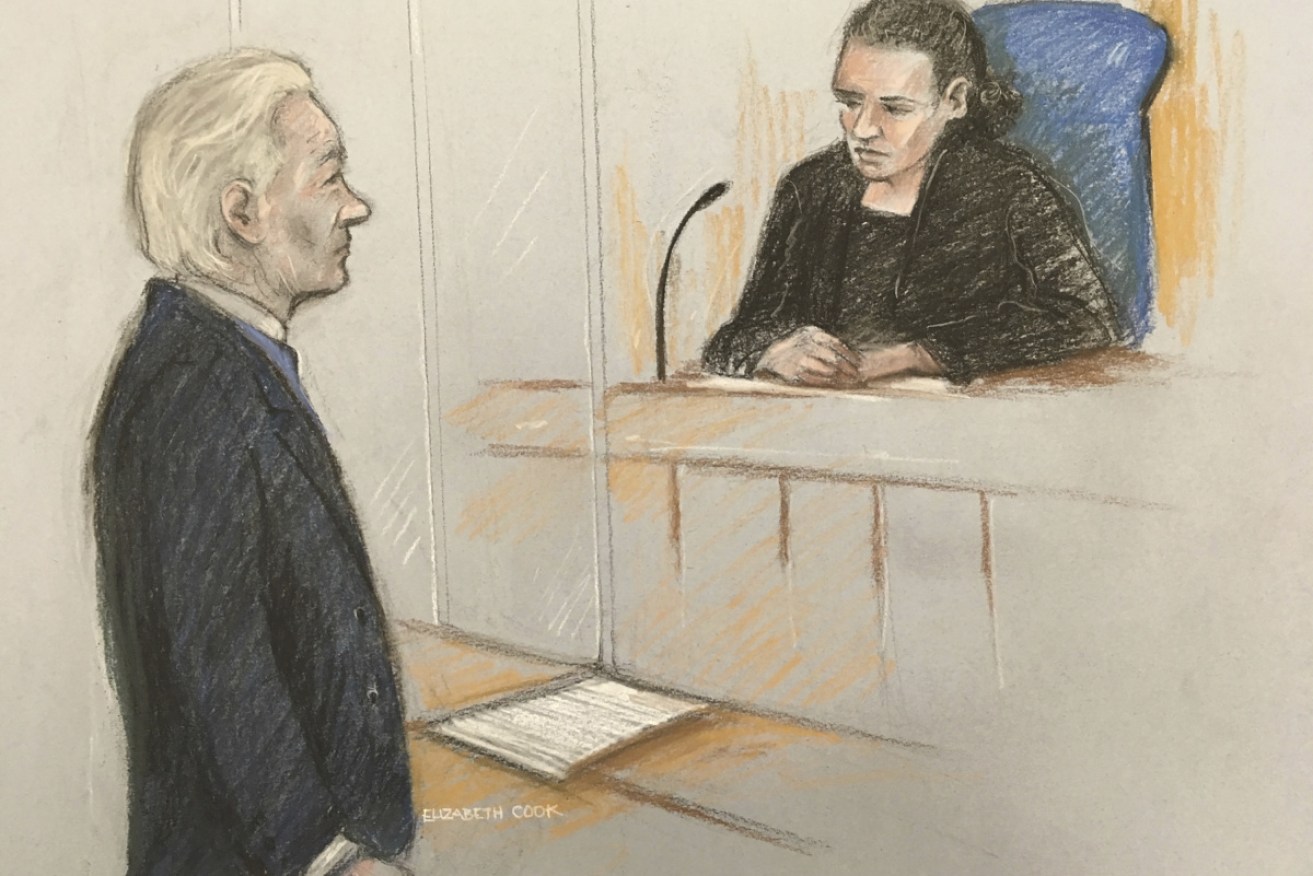Julian Assange teary and confused in court as he is dealt another blow in extradition battle


Wikileaks founder Julian Assange was denied a delay to his extradition hearing. Photo: AAP
Wikileaks founder Julian Assange struggled to recall his name and age in court on Monday where a London judge refused a bid to delay his February extradition hearing.
Assange, 48, appeared confused and mumbled during his case management hearing in the Westminster Magistrates Court, where his lawyer was denied extra time to prepare the case.
The American government is seeking to extradite Assange to prosecute him over the leak of hundreds of thousands of classified documents. He could spend decades in prison if convicted.
On Monday he appeared clean-shaven, without the long beard he had worn in his last public appearance in May when he was pulled from the Ecuadorian embassy and sentenced to 50 weeks for skipping bail.
He wore a blue suit and a light blue collar and appeared to raise his fist to supporters in the public gallery.
But he appeared confused, struggling to remember his birth date when asked to give it at the beginning of Monday’s hearing.

Supporters of Assange demonstrated outside court on Monday. Photo: AAP
He later admitted he did not fully understand what had occurred in court when asked by District Judge Vanessa Baraitser.
Fighting back tears he said: ”Not really. I can’t think properly,” he mumbled, before adding that the US government had an unfair advantage in the case, and accused them of stealing his children’s DNA.
“I don’t understand how this is equitable. This superpower had 10 years to prepare for this case and I can’t access my writings. It’s very difficult where I am to do anything but these people have unlimited resources,” he said.
“They are saying journalists and whistleblowers are enemies of the people. They have unfair advantages dealing with documents. They (know) the interior of my life with my psychologist. They steal my children’s DNA. This is not equitable what is happening here.”
Assange has been held in London’s Belmarsh prison since his sensational April 11 arrest at the Ecuadorian embassy, where he had lived in political asylum for almost seven years.
He has been charged in the US with 17 counts of spying and one count of computer hacking in relation to WikiLeaks’ release of thousands of classified Pentagon files regarding the Iraq and Afghanistan wars.
Tweet from @RT_com
Assange’s barrister Mark Summers QC said Assange cannot be extradited for political offences.
“Our case will be that this is a political attempt to signal to journalists the consequences of publishing information. It is legally unprecedented,” he told the court.
Assange’s solicitors Birnberg Peirce later issued a statement further clarifying that extradition for political offences is “prohibited and unlawful” under the UK-US extradition treaty of 2003.
Mr Summers said he was deeply concerned about Assange’s ability to prepare for his case, given he has had no computer access since his incarceration began.
He also explained that the case was growing increasingly complicated as new evidence came to light.
Earlier this month Spain’s National Court announced it was investigating whether a Spanish security firm spied on Assange in the embassy with hidden microphones and other devices.
The information was allegedly passed to Ecuadorean and US authorities.
“The American state had been actively engaged in intruding into privileged discussions between Mr Assange and his lawyers in the embassy, also unlawful copying of their telephones and computers (and) hooded men breaking into offices,” Mr Summers said.
He told the court there had been “plans to kidnap and harm” Assange.

Street art depicting Assange near Westminster Magistrates’ Court in London. Photo: AAP
Mr Summers asked Judge Baraitser to delay the extradition trial and to extend the length of the five-day hearing so his client could adequately prepare evidence.
But the judge told Assange that the court had no jurisdiction over the conditions of his imprisonment and said he would not be granted any more time.
In August, London-based human rights lawyer Jennifer Robinson, who is part of Assange’s legal defence, pleaded with Australians to support his case.
“That an Australian citizen, who is a publisher of information, who won a Walkley, now faces 175 years in prison – that is a grave concern from a free speech perspective,” she told The New Daily.
“What do our passports mean? And what does it mean for press freedom? I think a lot of Australians are concerned about the raids on the ABC.
“The parallel between those raids and indictment for Julian Assange – his case is emblematic of a global pushback on free speech.”
Assange’s next case management hearing is on December 19 and a full extradition hearing is scheduled for February 25.
-with AAP








